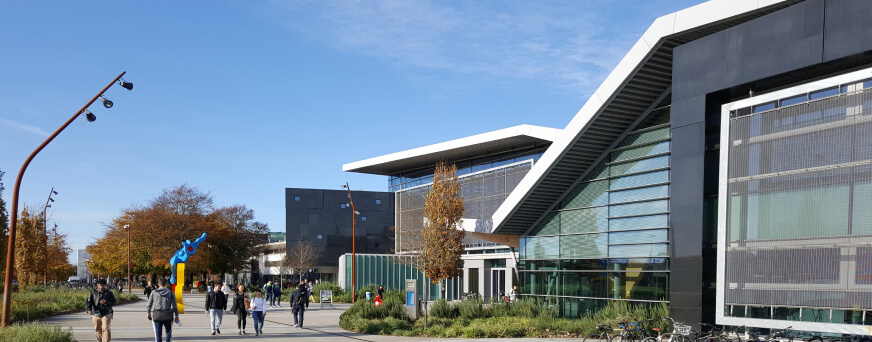Explore University of McCordsville’s Eligibility Criteria for Students Worldwide
High School Diploma, GED or equiv. International Education
144 Hours
4 Year (Self-Paced) Program
24
The course explores philosophic and artistic heritage of humanity expressed through a historical perspective on visual arts, music, and literature. Topics include myth, literature, art, music, television, cinema, and the theater. Also discussed are provocative issues in the humanities - religion, morality, happiness, death, freedom, and controversies in the arts.
Social and Cultural Geography considers why geography matters to the analysis and understanding social relations, cultural identity and social inequality. Course examines how social life is structured at a variety of scales with respect to ethnicity, industries, services, urban patterns, and resources of world as a whole.
English Composition provides you with rhetorical foundations that prepare them for academic and professional writing. You will learn the strategies and processes that successful writers employ as you work to accomplish specific purposes. You will develop skills in writing unified, coherent, well-developed essays using correct grammar and effective sentence structure.
College Algebra provides an overview of the fundamental concepts of algebra: an understanding of the general concepts of relation and function; and the ability to solve practical problems using algebra.
World Religions course offers the broadest coverage of world religions as they exist today; helping you understand the ideology behind the many religions that strive today. While it is impossible to cover all religions, it does cover those of the vast majority of people.
Evenly balanced between theory and applications, this course shows you how to establish an ethical theory and how to apply it to a range of specific moral issues. This course examines ethical problems in such areas as mercy killing, personal relations, business, sexuality, medicine, and the environment.
This course introduces the origins and historical development of art. Emphasis is placed on the relationship of design principles to various art forms including but not limited to sculpture, painting, and architecture. Upon completion, you should be able to identify and analyze a variety of artistic styles, periods, and media.
This course provides the mathematical foundation for an introductory calculus course. In addition to a brief review of basic algebra, the course covers equations and inequalities; functions, models, and graphs; polynomial and rational functions; exponential and logarithmic functions; trigonometric functions; and trigonometric identities and equations.
This course is an introductory study of the human body, including the basic structure and function of the major organ systems (nervous, endocrine, circulatory, reproductive, etc.) and the effects of diet, exercise, stress and environmental change on human health.
World History course present the big picture, to facilitate comparison and assessment of change, and to highlight major developments in world's history. This course emphasizes the global interactions of major civilizations so that you can compare and assess changes in the patterns of interaction and the impact of global forces.
Teaching is a profession that can yield something amazing when the right ideas and beliefs are implemented in the classroom. The purpose of this course is to induce you to the concept of teaching as a profession. The course presents various learning methods and role of Education in 21st Century.
The course introduces you to the concepts of differentiated instruction, differentiating planning, differentiated assessment and differentiated learning experiences. The course also includes grouping, differentiation, and enrichment of gifted children.
The course introduces you to the concepts of physical development, cognitive development, emotional and social development and physical and cognitive development. The course also presents tools for learning in real time and online learning activities.
The purpose of this course is to enable you to think critically about contemporary education issues, so they can develop creative solutions to difficult problems. This will be accomplished by gaining an understanding of the history of these issues and problems.
This course explores the underlying principles and philosophical foundations of teaching and education and examines how teachers function on the basis of a set of assumptions and beliefs regarding what they teach, how they teach, and to what end they teach.
This course prepares educators to use, evaluate, and integrate a variety of computer-based programs into the classroom. The course also covers use of graphic tools in education, how technology is used to provide education to special children and issues and challenges of technology in education.
This course explains the cognitive, linguistic, personal, social, and moral development of individuals as well as individual and group differences. This lesson also describes behaviorist and social cognitive views of learning, intrinsic and extrinsic motivation, and informal and formal assessments.
The course teaching for special fields provides you with a comprehensive overview of major aspects of the field of special education. This course emphasizes how students with special needs can succeed in the general education classroom with the assistance of the teacher and other members of the team.
Art has traditionally been an important part of early childhood programs. The purpose of this course is to discuss the importance of art in young children's learning and development and to describe elements of an art program within a developmentally appropriate early childhood curriculum.
The Early Childhood Special Education course provides you with both theoretical knowledge and practical skills. You would be able to screen and identify the unique needs of preschoolers and their families; and define early intervention services needed to address those unique needs.
The course is designed to teach the methods and proper use of materials for presenting creative learning experiences to young children in the areas of language, creative dramatics, art, music, movement, math, science, emergent literacy, and outdoor activities.
The course includes history, philosophy, and the application of child development techniques. The course explores techniques for observing and recording behaviors, communication skills, guidance techniques, developmentally appropriate practices and the role of the teacher in early childhood settings.
The course introduces you to the concepts of oral and written language acquisition, along with other areas of communication. Topics covered in this course are language development in preschoolers, kindergarteners, enhancing language development in primary years and language development among children with communicative disorders etc.
This course provides you with an introduction to methods and materials to assist young children in the learning process. Emphasis will be placed on arrangement of indoor/outdoor space, music and movement, dramatic play and creative media.
| Tuition Fee Breakdown 1 | Cost |
|---|---|
| BACHELORS DEGREE | $31,680 |
| Medical Insurance | $0.00 |
| Personal Expenses | $0.00 |
| Study Materials | $0.00 |
| Food Cost | $0.00 |
| Total Tuition Fee | $31,680 |
At University of McCordsville, we champion the convergence of affordability and opportunity. Our steadfast commitment to accessible education guarantees that high-quality learning is accessible to all. By eliminating financial obstacles, we grant students the freedom to thrive without the burden of overwhelming tuition costs, empowering them to carve out a bright and promising future.

| Topics Covered in This Course: | |||||||||||||||||||||||||||||||||
|
| Topics Covered in This Course: | |||||||||||||||||||
|
| Topics Covered in This Course: | |||||||||||||||||||||||||||||||||||
|
| Topics Covered in This Course: | |||||||||||||||||||||||||||||||||
|
| Topics Covered in This Course: | |||||||||||||||||||||||||||||||
|
| Topics Covered in This Course: | |||||||||||||||||||||||||||||||||||||
|
| Topics Covered in This Course: | |||||||||||||||||||||||||||||||||||||
|
| Topics Covered in This Course: | |||||||||||||||||||||||||
|
| Topics Covered in This Course: | |||||||||||||||||||||||||||||||||
|
| Topics Covered in This Course: | |||||||||||||||||||||||||||||||||||||||||||||||||||||||||||||||||||
|
| Topics Covered in This Course: | |||||||||||||||||||||||||||||||
|
| Topics Covered in This Course: | |||||||||||||||||||||||||||||||||
|
| Topics Covered in This Course: | |||||||||||||||||||||||||||||
|
| Topics Covered in This Course: | |||||||||||||||||||||||||||||||||||||
|
| Topics Covered in This Course: | |||||||||||||||||||||||||
|
| Topics Covered in This Course: | |||||||||||||||||||||||||||||
|
| Topics Covered in This Course: | |||||||||||||||||||||||||
|
| Topics Covered in This Course: | |||||||||||||||||||||||||||||||||||||
|
| Topics Covered in This Course: | |||||||||||||||||||
|
| Topics Covered in This Course: | |||||||||||||||||||||||||||
|
| Topics Covered in This Course: | |||||||||||||||||||||||||||||||
|
| Topics Covered in This Course: | |||||||||||||||||||||||||||||||
|
| Topics Covered in This Course: | |||||||||||||||||||||||||||||||
|
| Topics Covered in This Course: | |||||||||||||||||||||||||||||||||||
|
“Every minute spent under the guidance and supervision of the University of McCordsville was worth it for a student like me.”

“An amazing online platform, supportive staff, and valuable career resources. I highly recommend the University of McCordsville.”

“Scholarship opportunities, personalized support, and impactful learning. I am grateful for my journey at the University of McCordsville!”
